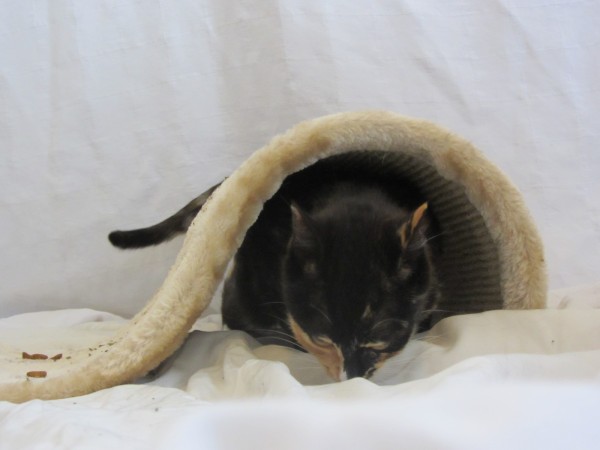
24 Apr Second Chance: Protecting Your Pet in Summer
From the Vet, suggestions to help you and your pet have an enjoyable healthy summer
It’s that time of year again: when the sun is out and warm and the hiking and camping beckon, and if you live in the Telluride region for the same reason I live here, you take your dog and spend as much time outside as possible. Romeo and Sparkle, our beautiful blue nose pitty and Calico kitty, both rescues looking for their forever homes at Second Chance Humane Society, love to take walks outside and explore the mountains. However, when these two or you and your pet are enjoying the season, it’s important to keep an eye out for ticks.
Ticks suck blood, but blood loss is not why they are a health issue – they are a health issue because while they suck blood they can transmit disease, the most common of which in Colorado is tick fever. It is NOT Rocky Mountain Spotted Fever. In fact, despite its name, RMSF is rare in Colorado (more endemic to places on the Atlantic.) Lyme disease is also very rare here.
There are two diseases you SHOULD be concerned about with ticks in this area:
Colorado Tick Fever: 200 cases are reported in Colorado every year and epidemiologists believe it is severely underreported. The infection causes flu-like fever and chills, aches, and fatigue in mammals, which typically last one to three days. Because Tick Fever clears up on its own, rest and symptomatic treatment is all that is needed unless complications arise.
Tick Paralysis – This is fairly uncommon, but because it is so devastating everyone who lives here needs to know about it. A tick can affect your animal’s (or your) central nervous system. Suddenly your dog is having difficulty walking, then it can’t feel its back feet. The paralysis ascends up the body, eventually causing difficulty breathing and ultimately death. Removing the tick reverses the condition. Because dogs can’t tell us they have a tick, and because they don’t have opposable thumbs with which to pull one off themselves, this disease takes far too many dogs from their loving owners.
Preventing tick disease: To protect your animal, the best prevention is vigilance. Check for ticks! After any walk, any run, any camping. Remove ticks with tweezers, gripping close to the skin. Use the preventative products recommended by your veterinarian. However, beware of using “for dogs only” products on cats. The wrong meds can kill them!
Ticks aren’t the only health challenge the summer brings. Drinking stagnant water on your river walks can result in giardia, the increased critter and loose dog population can result in bite wounds, and those ever present porcupines can implant painful quills into animals.
Being alert to these dangers can minimize their impact and help ensure you and your pet have an enjoyable healthy summer.
Editor’s note: It’s no secret. The Telluride region is dog heaven. Well, pet heaven. Unless you are one of our furry friends who gets caught in the maw of neglect and abuse. Then heaven is on hold until Second Chance Humane Society comes to the rescue. Second Chance is the region’s nonprofit dedicated to saving animals’ lives and promoting responsible pet parenting and human-animal bond. In her weekly blog, executive director Kelly Goodin profiles at least one, generally two of the many animals now living at the no-kill shelter, Angel Ridge Shelter, a dog and a cat, hoping to find them loving permanent homes. The column is sponsored by Ted Hoff of Cottonwood Ranch & Kennel, who from time to time exercises his skills as a dog whisperer, partnering with Kelly and her staff to help train a particularly challenging animal.
By the by, there is no better place to park your pup than Cottonwood whenever you head out of town (for locals) or are heading to town and staying somewhere that does not allow pets. Consider joining Ted’s Very Important Dog (VID) Club for added benies. (Details on Ted’s website.)
Second Chance Humane Society Animal Resource Center and Thrift Shop are both located in Ridgway, but service San Miguel, Ouray & Montrose Counties. Call the SCHS Helpline at 626-2273 to report a lost pet, learn about adopting a homeless pet, or about the SCHS Spay/Neuter, Volunteer, Feral Cat, or other Programs. View the shelter pets and services online: www.adoptmountainpets.org





Sorry, the comment form is closed at this time.